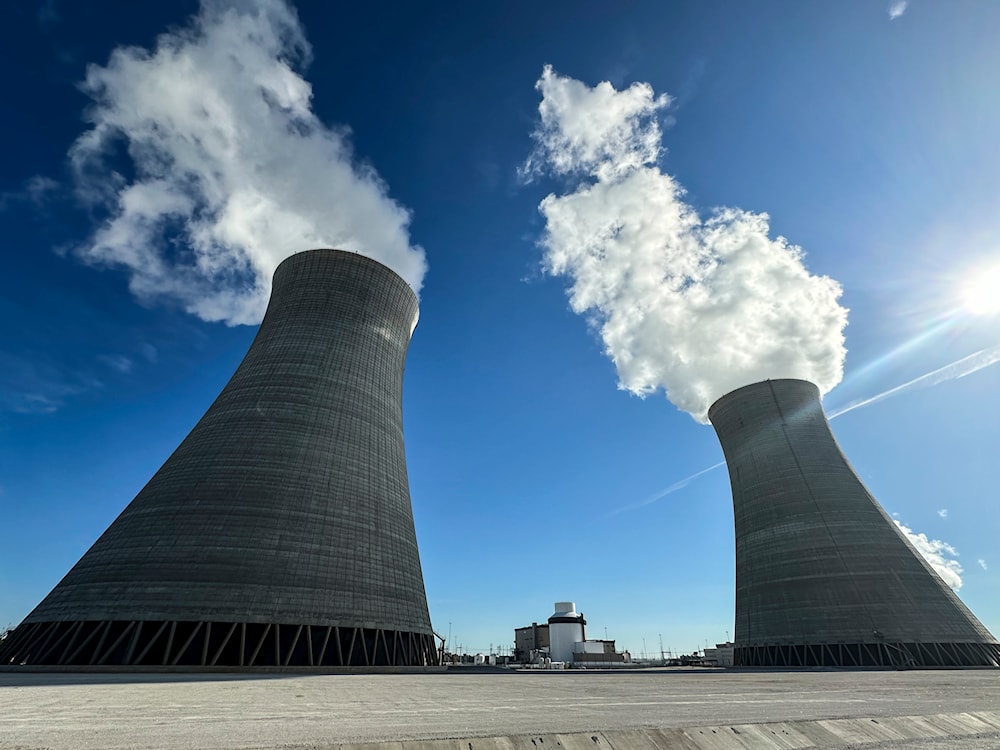US, European energy companies in jeopardy amid uranium supply 'crunch'
The uranium "supply crunch" comes as Kazakhstan, the largest exporter of Uranium worldwide, ups its sales of uranium to China and Russia.
-

Cooling towers four, left, and three are seen at the nuclear reactor facility at the Alvin W. Vogtle Electric Generating Plant, on Friday, May 31, 2024 (AP)
American and European energy companies are at risk as they face a "uranium crunch" as demand for nuclear power, used to fuel everything from household electricity to data centers, increases, industry figures warned.
The threat of future shortages comes as Kazakhstan, the world’s biggest producer of the metal used to power nuclear reactors, sells more to Russia and China and less to the US and Europe.
“Russian and Chinese players have been very keen to secure access to resources in central Asia and Africa, creating a very aggressive competitive environment,” said Benjamin Godwin at Prism Strategic Intelligence.
However, despite there being a surplus of uranium, executives say it is slowly being depleted. “We’re on a depletion curve that I don’t think many customers have realized,” said Cory Kos, vice president of investor relations at Cameco, one of the world’s largest publicly traded uranium producers and the biggest western supplier based in Canada.
“As an industry, we’re living off borrowed time... inventory that’s running out has kept the supply chain going," one former executive added.
Energy companies get their power from a diverse range, however, as the demand for cleaner power increases, so does the demand for nuclear power: nations including the US, the UK, and South Korea have pledged to triple global nuclear energy capacity by 2050.
China and Russia, who border Kazakhstan, are also looking into expanding their nuclear power domestically, with the US Center for Strategic and International Studies saying that China and Russia were “rapidly expanding their offtake of mined uranium from international partners.”
The US Center for Strategic and International Studies (CSIS) warned this month that China and Russia were “rapidly expanding their offtake of mined uranium from international partners”.
It added that there was a “disconnect” between efforts among Western governments to secure the uranium supply chain, “including uranium mining”, and plans to expand the use of the fuel.
Russia, China lead nuclear energy
China is ahead of the United States by up to 15 years in the advancement of high-tech nuclear power, as per a report by the Information Technology & Innovation Foundation, which stated that China's advantage comes from its state-supported technological strategy.
"China’s rapid deployment of ever-more modern nuclear power plants over time produces significant scale economies and learning-by-doing effects, and this suggests that Chinese enterprises will gain an advantage at incremental innovation in this sector going forward," the report stressed.
Russia, on the other hand, announced an agreement with Iran on January 18 to expand their nuclear energy collaboration, including building small-scale and large-scale nuclear power plants, as part of a 20-year strategic partnership treaty.
Prior to that, Russia and Vietnam signed cooperation agreements on nuclear energy on January 14 as Vietnam looks to bring back its nuclear program, which was suspended for years, to meet the growing power demands for its growing industrial sector.
Russia and the Congo signed memoranda of cooperation on several different issues, including the peaceful use of nuclear energy, with the President of the Republic of the Congo announcing plans to expand energy cooperation with Russia.

 3 Min Read
3 Min Read










